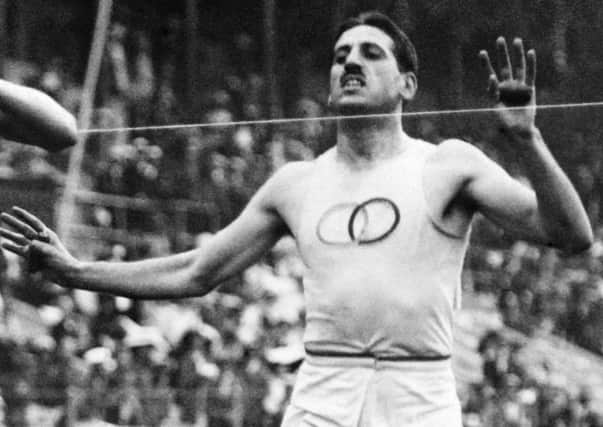Martyn McLaughlin: IOC refusal to ban Russia reduces Rio to farce


When Baron Pierre de Coubertin, a minor French aristocrat, struck upon the idea of reviving the Olympic Games for the modern age, he could not resist the opportunity to circumvent his own physical shortcomings in the pursuit of glory. An aesthete whose adoration of athletic prowess was matched only by scholarly ambition, he insisted that the 1912 Stockholm Games include a raft of artistic disciplines spanning the likes of architecture, painting and sculpture.
It was the fifth and final competition of that grouping – the literature prize – that came to be regarded as the most prestigious. Rewarding those who wield a pen with grace and precision was a harmonious fit with de Coubertin’s belief that if the ancient Greeks held the arts in the same high regard as Herculean feats, then he should follow suit.
Advertisement
Hide AdAdvertisement
Hide AdAs it turned out, the Parisian overestimated the appeal of the Olympics to lettered men. The judges received only the one submission, a somewhat florid paean to the concept of the resurgent Games. Entitled Ode to Sport, its opening stanza began: ‘O Sport, pleasure of the Gods, essence of life! / You appeared suddenly in the midst of the grey clearing which writhes / With the drudgery of modern existence’.
Its joint wordsmiths, Georges Hohrod and Martin Eschbach, were unknown names, yet their entry secured them a profitable place atop the podium back in the days when medals were forged out of solid gold. It was only several weeks after the Games came to an end that the organisers, having difficulty tracking down Hohrod and Eschbach to hand them their glittering prize, discovered the ode’s true author: a certain Baron Pierre de Coubertin.
That indulgence for self-serving pseudonyms did not sully the bold Pierre’s standing in the history books. As the man who founded the International Olympic Committee (IOC) and created the modern pentathlon, he is viewed as the father figure of the modern Olympic movement. To this day, a special medal in his name is given sparingly to those competitors who demonstrate outstanding sportsmanship. According to the Olympic Museum in Lausanne, it is “one of the noblest honours that can be bestowed upon an Olympic athlete” and it is considered by some to be even more hallowed than the hue of gold.
The Games of the XXXI Olympiad are only a few days away, but it is surely not too late to propose a late amendment to the sporting programme so as to pay tribute to Monsieur de Coubertin’s timeless spirit of manipulation, one his successors have shown to prevail over outmoded notions such as integrity.
The shooting contest could be invigorated by the inclusion of live, moving targets in the form of bothersome doping whistleblowers. The 4x100 metres relay, an event in which the Jamaicans command an unassailable advantage, could be rendered more equitable were the batons to be were replaced by unsealed urine samples.
Dressage, an experience akin to watching a lost horse that is too proud to stop and ask for directions, might broaden its appeal were the riders forced to compete bare-chested in a rock-strewn approximation of the Siberian hinterlands. That leaves only the question of who will receive the hallowed Pierre de Coubertin medal. Given the IOC’s beguiling exhibition of meek capitulation in recent days, it is surely a rhetorical question.
Whatever values the Olympic movement holds dear have been dealt a near fatal blow by the revelation that even sportsmanship has its price. Presented with incontrovertible evidence of institutionalised Russian cheating by the McLaren report, the IOC’s refusal to impose a blanket ban has reduced the proceedings in Rio to a pantomime.
Aristotle, one of the most ardent followers of the ancient Games, once made a cautionary observation. “Some exceed in taking by taking anything from any source,” he wrote. “What is common in them is sordid love of gain. They put up with a bad name for the sake of gain.”
Advertisement
Hide AdAdvertisement
Hide AdThe philosopher may have had pimps and moneylenders in mind when he committed that phrase to parchment, but his admonition easily applies to Thomas Bach, the IOC’s discredited president, whose mutually beneficial tryst with Vladimir Putin has been shown to be as brazen as many suspected.
Instead of seizing upon the devastating revelations of whistleblowers Yuliya and Vitaliy Stepanova as an opportunity to reaffirm the ideals of the Olympic movement, Bach has demonstrated that principles are wholly subservient to political patronage and money.
The interminable track record of Fifa and the Union Cycliste Internationale should have disavowed optimists of any lingering notions that sport can rely on its governing bodies to execute their duties justly, but the IOC’s stance is especially galling. It is the guardian of a set of ideals so elevated they are codified in the Olympic Charter, a 109-page treatise espousing concepts such as “ethics” and “fair play”. That its true doctrine goes unwritten does not make it any less transparent.
Back when de Coubertin proposed his poetic competition for the 1912 Games, his Swedish hosts were distrustful of the idea, with one intellectual complaining that it “totally lacked a meaningful purpose”.
Over a century later, the fact that other eclectic disciplines such as deception and corruption are being so handsomely rewarded shows that while the Olympics’ credibility steadily erodes, the preservation of power and influence continues to be prized by its custodians at any cost.